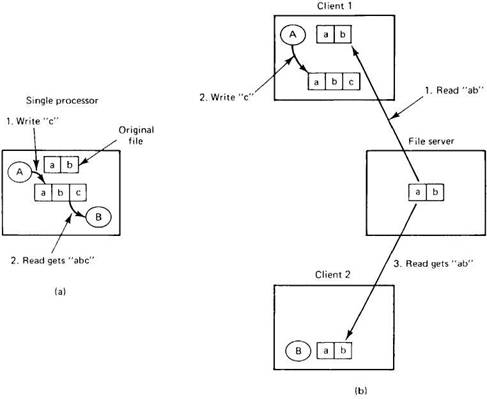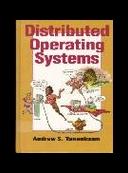Книга: Distributed operating systems
5.1.3. Semantics of File Sharing
5.1.3. Semantics of File Sharing
When two or more users share the same file, it is necessary to define the semantics of reading and writing precisely to avoid problems. In single-processor systems that permit processes to share files, such as UNIX, the semantics normally state that when a READ operation follows a WRITE operation, the READ returns the value just written, as shown in Fig. 5-4(a). Similarly, when two writes happen in quick succession, followed by a READ, the value read is the value stored by the last write. In effect, the system enforces an absolute time ordering on all operations and always returns the most recent value. We will refer to this model as UNIX semantics. This model is easy to understand and straightforward to implement.

Fig. 5-4. (a) On a single processor, when a READ follows a WRITE, the value returned by the read is the value just written. (b) In a distributed system with caching, obsolete values may be returned.
In a distributed system, UNIX semantics can be achieved easily as long as there is only one file server and clients do not cache files. All reads and WRITES go directly to the file server, which processes them strictly sequentially. This approach gives UNIX semantics (except for the minor problem that network delays may cause a READ that occurred a microsecond after a write to arrive at the server first and thus get the old value).
In practice, however, the performance of a distributed system in which all file requests must go to a single server is frequently poor. This problem is often solved by allowing clients to maintain local copies of heavily used files in their private caches. Although we will discuss the details of file caching below, for the moment it is sufficient to point out that if a client locally modifies a cached file and shortly thereafter another client reads the file from the server, the second client will get an obsolete file, as illustrated in Fig. 5-4(b).
One way out of this difficulty is to propagate all changes to cached files back to the server immediately. Although conceptually simple, this approach is inefficient. An alternative solution is to relax the semantics of file sharing. Instead of requiring a READ to see the effects of all previous WRITEs, one can have a new rule that says: "Changes to an open file are initially visible only to the process (or possibly machine) that modified the file. Only when the file is closed are the changes made visible to other processes (or machines)." The adoption of such a rule does not change what happens in Fig. 5-4(b), but it does redefine the actual behavior (B getting the original value of the file) as being the correct one. When A closes the file, it sends a copy to the server, so that subsequent READs get the new value, as required. This rule is widely implemented and is known as session semantics.
Using session semantics raises the question of what happens if two or more clients are simultaneously caching and modifying the same file. One solution is to say that as each file is closed in turn, its value is sent back to the server, so the final result depends on who closes last. A less pleasant, but slightly easier to implement alternative is to say that the final result is one of the candidates, but leave the choice of which one unspecified.
One final difficulty with using caching and session semantics is that it violates another aspect of the UNIX semantics in addition to not having all reads return the value most recently written. In UNIX, associated with each open file is a pointer that indicates the current position in the file. READs take data starting at this position and writes deposit data there. This pointer is shared between the process that opened the file and all its children. With session semantics, when the children run on different machines, this sharing cannot be achieved.
To see what the consequences of having to abandon shared file pointers are, consider a command like
run >out
where run is a shell script that executes two programs, a and b, one after another. If both programs produce output, it is expected that the output produced by b will directly follow the output from a within out. The way this is achieved is that when b starts up, it inherits the file pointer from a, which is shared by the shell and both processes. In this way, the first byte that b writes directly follows the last byte written by a. With session semantics and no shared file pointers, a completely different mechanism is needed to make shell scripts and similar constructions that use shared file pointers work. Since no general-purpose solution to this problem is known, each system must deal with it in an ad hoc way.
A completely different approach to the semantics of file sharing in a distributed system is to make all files immutable. There is thus no way to open a file for writing. In effect, the only operations on files are CREATE and READ.
What is possible is to create an entirely new file and enter it into the directory system under the name of a previous existing file, which now becomes inaccessible (at least under that name). Thus although it becomes impossible to modify the file x, it remains possible to replace x by a new file atomically. In other words, although files cannot be updated, directories can be. Once we have decided that files cannot be changed at all, the problem of how to deal with two processes, one of which is writing on a file and the other of which is reading it, simply disappears.
What does remain is the problem of what happens when two processes try to replace the same file at the same time. As with session semantics, the best solution here seems to be to allow one of the new files to replace the old one, either the last one or nondeterministically.
A somewhat stickier problem is what to do if a file is replaced while another process is busy reading it. One solution is to somehow arrange for the reader to continue using the old file, even if it is no longer in any directory, analogous to the way UNIX allows a process that has a file open to continue using it, even after it has been deleted from all directories. Another solution is to detect that the file has changed and make subsequent attempts to read from it fail.
A fourth way to deal with shared files in a distributed system is to use atomic transactions, as we discussed in detail in Chap. 3. To summarize briefly, to access a file or a group of files, a process first executes some type of BEGIN TRANSACTION primitive to signal that what follows must be executed indivisibly. Then come system calls to read and write one or more files. When the work has been completed, an END TRANSACTION primitive is executed. The key property of this method is that the system guarantees that all the calls contained within the transaction will be carried out in order, without any interference from other, concurrent transactions. If two or more transactions start up at the same time, the system ensures that the final result is the same as if they were all run in some (undefined) sequential order.
The classical example of where transactions make programming much easier is in a banking system. Imagine that a certain bank account contains 100 dollars, and that two processes are each trying to add 50 dollars to it. In an unconstrained system, each process might simultaneously read the file containing the current balance (100), individually compute the new balance (150), and successively overwrite the file with this new value. The final result could either be 150 or 200, depending on the precise timing of the reading and writing. By grouping all the operations into a transaction, interleaving cannot occur and the final result will always be 200.
In Fig. 5-5 we summarize the four approaches we have discussed for dealing with shared files in a distributed system.
| Method | Comment |
|---|---|
| UNIX semantics | Every operation on a file is instantly visible to all processes |
| Session semantics | No changes are visible to other processes until the file is closed |
| Immutable files | No updates are possible; simplifies sharing and replication |
| Transactions | All changes have the all-or-nothing property |
Fig. 5-5. Four ways of dealing with the shared files in a distributed system.
- 5.1. DISTRIBUTED FILE SYSTEM DESIGN
- Shared Cache file
- Безопасность внешних таблиц. Параметр EXTERNAL FILE DIRECTORY
- Chapter 13. rc.firewall file
- 4.3.3. Makefile Targets
- Что это за файл – pagefile.sys?
- Для чего нужны папки Windows, Documents and Settings, Program Files и Temp?
- Можно ли указать использование по умолчанию вместо C:Program Files другого каталога для установки программ?
- Можно ли удалять из папки Program Files папки деинсталлированных программ?
- Диски С: и D: невозможно открыть простым щелчком кнопки мыши. Появляется сообщение Не найден файл file.exe. Что делать?
- 10.2 Modifying the .emacs File Directly
- Use and Edit Files in the




